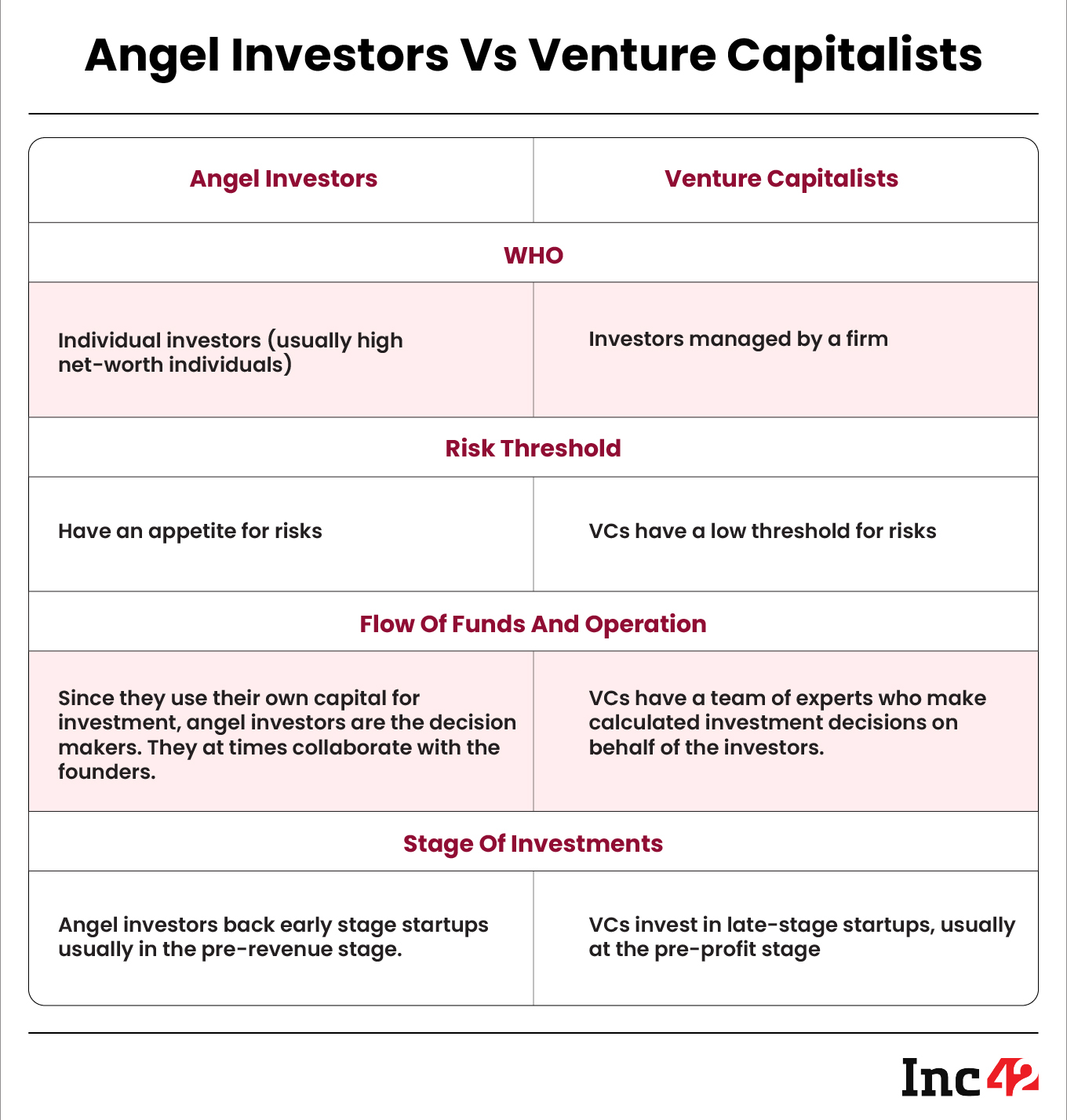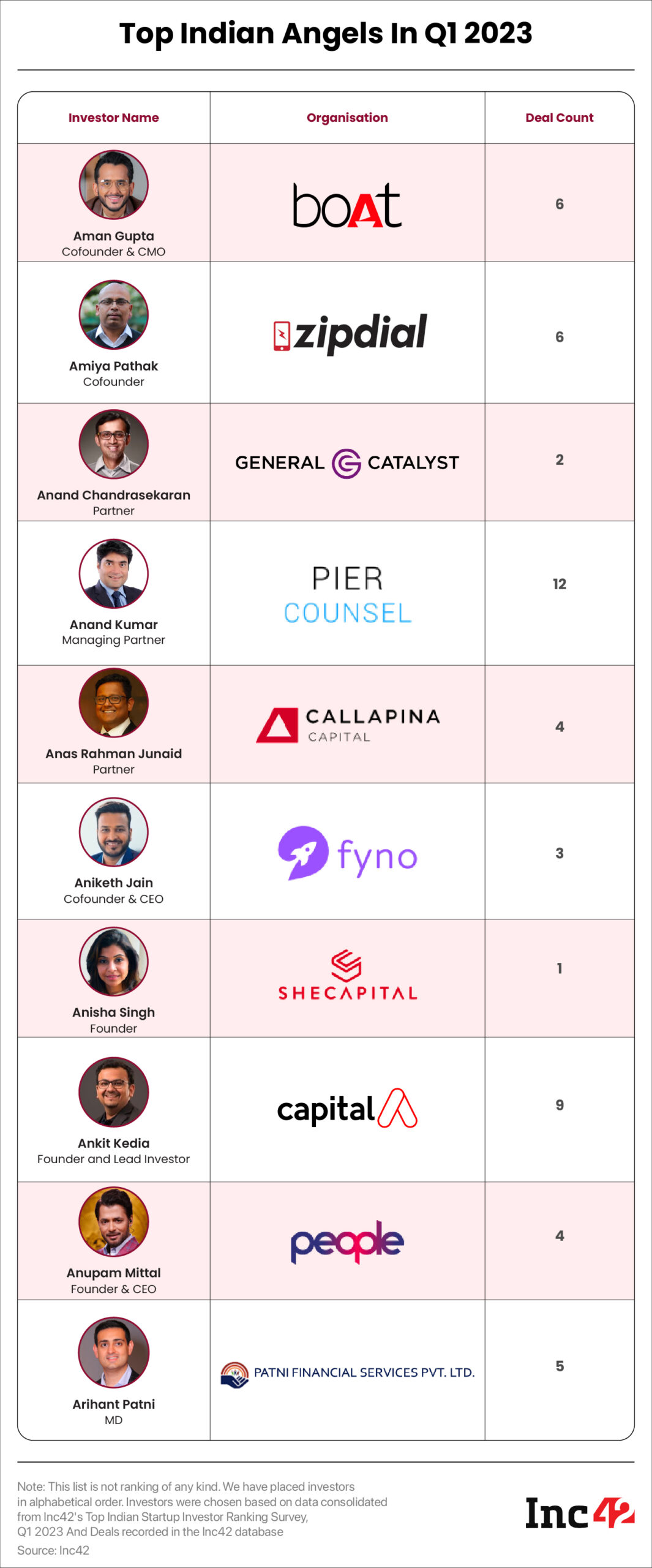Who Are Angel Investors?
Angel investors are individuals, who invest in startups in their seed, early or pre-revenue stage in exchange for equity ownership. Such investors are generally high-net-worth individuals (HNIs).
Government’s Invest India says that an angel investor is any person who proposes to invest in an angel fund and satisfies one of the following conditions:
- The individual’s net tangible assets must be of at least INR 2 Cr, excluding the value of his principal residence.
- The individual must have early stage investment experience, or experience as a serial entrepreneur, or is a senior management professional with at least ten years of experience.
- A corporate body with a net worth of at least INR 10 Cr, or an alternate investment fund (AIF)/venture capitalist fund (VCF) registered under these regulations.
What Is The Difference Between Angel Investors And Venture Capitalists?

What Are The Characteristics Of A Successful Angel Investor?
While there is no playbook that defines a good or bad angel investor, the following traits make an angel investor stand out from amateurs.
- Successful angel investors are committed to their portfolio of startups beyond financial means. This includes displaying empathy and encouragement during the early stages of growth.
- Experienced angel investors offer valuable actionable insights after understanding their challenges.
- Angel Investors are well-connected and leverage their connections and network to introduce them to their portfolio startups.
- Angels Investors actively promote their portfolio startups through their own social media platforms to increase their visibility.
- Angel investors are supportive. They stick with their startups during challenging times.
Here Is A List Of India’s Top Angel Investors

What Are The Benefits Of Working With Angel Investors?
- Angel investors provide seed investment to build a strong foundation for early stage startups.
- In addition to the financial benefits, angel investors can lend credibility to early-stage startups through their association.
- Most angel investors share actionable industry insights that help young founders to grow.
- Angel investors put their own money into startups, therefore they are willing to share the risks that startups are exposed to.
- Angel investors that work closely with startups provide invaluable guidance and feedback.
How To Find An Angel Investor?
- One can start by examining their own circle and contact list.
- Potential founders can approach angel networks that are essentially a group of multiple angel investors like Indian Angel Network.
- Social media platforms can be instrumental in connecting investors with potential founders, especially LinkedIn.
- Be on the lookout for networking events that bring relevant stakeholders under one roof.
How To Pitch To Angel Investors?
- Before pitching to any angel investor, it is crucial for a founder to conduct thorough research to ensure alignment between the investor and the startup’s vision.
- Keep the pitch deck visual with fewer words and clearly bring out the solution that the product/service is offering.
- Include relevant data that indicates market opportunity, total addressable market (TAM), target audience, and projected revenue.
- There must also be an exit strategy for the investor in place.
- Presenting a live demo of the product/service will increase the chances of receiving the funding.
How Involved Are Angel Investors In The Businesses They Invest In?
They go beyond capital investment when they attach themselves to a startup. They often provide a holistic support system when they take a startup under their wings. They help startups mitigate risks, provide mentorship by sharing actionable industry insights, leverage their network for the startups’ growth and provide overall support by sticking around for a long haul.
Explaining why investors must stick around for a longer haul, experts believe that despite the temptation of exiting quickly after the first opportunity presents itself, investors must stay in for the unforeseen greater profit in the longer term.
They also believe that angel investors should invest in startups that face sector-related challenges, thus helping startups drive growth. They believe in investing in dynamic sectors that have challenges that can be learning experiences. Angel investors can add value to the startup ecosystem if they have a ‘decade-long horizon’ for bigger ROIs in the longer run.
What Are The Risks Associated With Onboarding Angel Investors?
- Taking a large amount of investment from angel investors can often lead to the expectation of a higher RoI within a crunched timeframe, adding pressure on the entrepreneur.
- If an entrepreneur chooses an investor with whom his company’s vision does not align, it can lead to conflicts and impact the company’s growth.
- Since the angel investor would be issued an equity share from the startup in exchange for capital, the potential founder’s ownership could be threatened.
How Do Angel Investors Get A Return On Investment (ROI)?
They get an ROI through profitable exits. What are exits? Angel investors exit from a startup that they have invested in after selling their shares to another company, investors or when the whole company is sold to another entity (M&A). Investors can even get favourable exits when a company goes for an IPO (initial public offering).
Some prominent examples of angel investment exits are Sanjay Mehta, the founder of 100X.VC and Rajesh Sawhney, the founder of GSF accelerator.
Between 2011 and 2020, Sanjay Mehta had at least 13 successful exits, which fetched him a 110% return.
Mehta achieved an impressive return of 280X from OYO and a staggering gain of 6.5K% within three years from his partial exit from Block.One, yielding a $6.6 Mn return on a $100,000 investment. As of 2021, he has made private investments in 150 companies.
Mehta said that it takes him an average of 3 to 5 years to receive a lucrative ROI. In total, Mehta’s 13 exits have got him 110% return against the industry average rate of return of 30%.
Meanwhile, Sawhney enjoyed a return of 25X and 50X from his portfolio startups Pokkt and DailyRounds after their acquisition in 2019 and 2020, respectively.
What Is Angel Tax?
As per section 56(2)(viib) of the Income Tax Act, 1961, all capital raised by private business entities via selling shares to investors above the fair market value (FMV) is liable for Angel Tax and is chargeable at the rate of 30.9% on net investments in excess of the fair market value.
Even though the tax was introduced in 2012, it was almost unheard of in the startup ecosystem almost until 2016. As the funding frenzy gripped the Indian startup ecosystem around the time, more and more startups came under the scanner of IT Department as some Assessing Officer (AOs) flagged the valuation of many startups, directing the latter to shell out the ‘dreaded’ Tax.
The situation exacerbated further in 2023, when Finance Minister Nirmala Sitharaman, in her Budget speech, brought non-resident investors under the ambit of the tax, which primarily impacted foreign investment in India and that too in the middle of a purported funding winter.
After much back and forth, the Ministry of Finance finally stepped in and, in much touted ‘reforms’, the Central Board of Direct Taxes (CBDT) proposed to exempt 21 countries, including Australia, the UK and the US, from being levied Angel Tax.
What Are Angel Investment Networks?
Angel networks bring angel investors together to create a fund pool for early stage startups or provide a platform to bring angel investors and early stage startups together. However, only some individuals can invest in angel funds, as every angel group has its specific guidelines and thresholds for choosing an angel investor.
Which Are Some Of The Most Renowned Platforms?
List of prominent angel networks:
- AngelList India
- BITS Spark
- The Bengaluru Angels
- Calcutta Angels Network
- Chandigarh Angels Network
- The Chennai Angels
- CIO Angel Network
- Hyderabad Angels
- Indian Angel Network
- Jito Angel Network
- Lead Angels Network
- LetsVenture
- Mumbai Angels Network
- Stanford Angels
- Venture Catalysts
Read About 13 Most Active Angel Networks For Indian Startups
What Is The Due Diligence Process For Angel Investors?
In order to make an informed investment decision, they must conduct due diligence, which involves an investigative process to assess the worthiness of a company for investment. Several critical factors must be thoroughly evaluated before committing capital following the due diligence process.
- The product/service must have a sizeable demand in the market.
- Investors must be able to define acceptable risks and weed out deal-breaking risks.
- Ensure provisions for angel investors to recover their investments in case of failure.
- Angel investors must consider exit strategies, whether they will be through acquisition or IPO.
- The business models should clearly state distribution strategies, USP, growth plans, recurring revenue potential, and capital requirements.
- Carefully evaluate the value proposition of the startup.
Assessing The Rise Of Angel Investors In India
Between 2014 and 2022, India had a total of 9.5K investors, which comprised angel investors, venture capitalists, corporate & CVCs, investment banks and accelerators & incubators among others.
Further, angel investors accounted for 53% or 5.1K of the total 9.5K investors. Angel investors were followed by venture capitalists at 23%, corporate & CVCs at 9.1% and investment banks at 6%, as recorded by Inc42.









